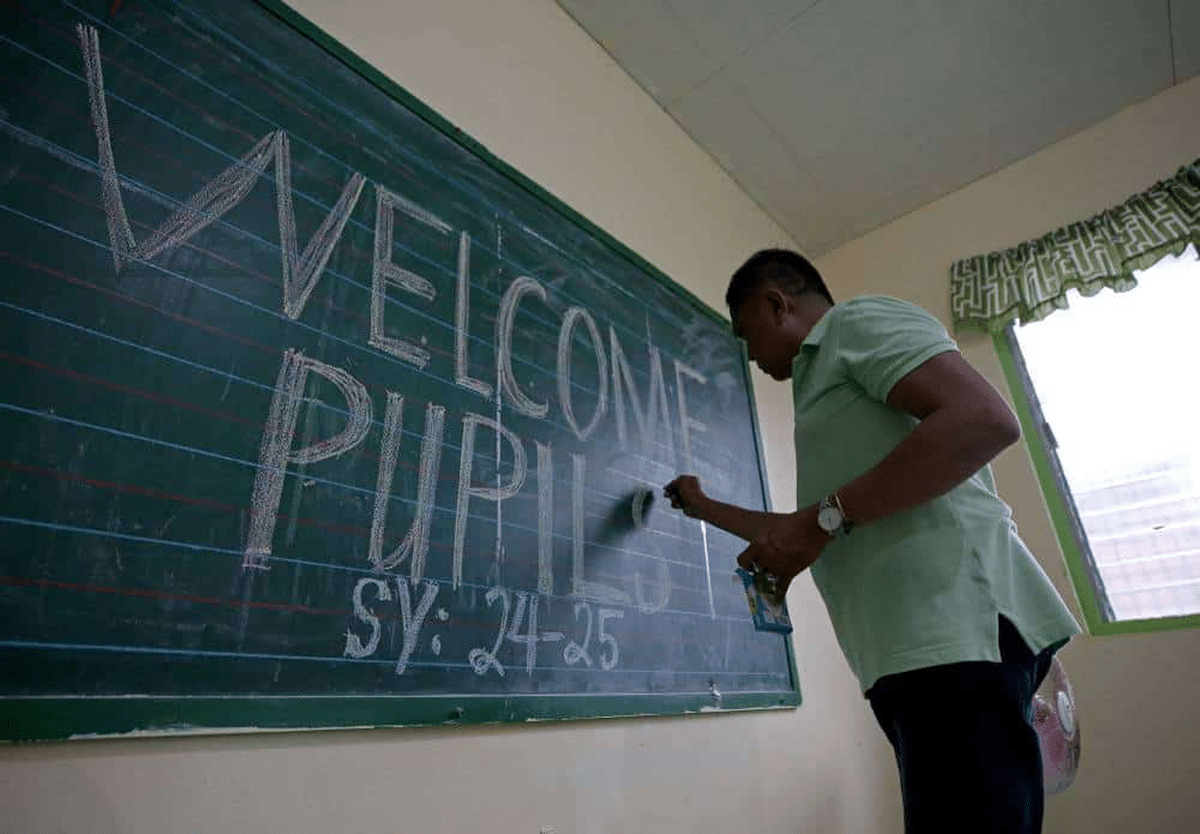Problems of past class opening persist in current school year

FILE PHOTO: Teacher Leo Chavit writes a welcome note at Wakas Elementary School in Kawit, Cavite, on July 28, 2024. —Inquirer/Richard A. Reyes
MANILA, Philippines — It’s a whole new school year, but with the same decades-old problems.
As students nationwide return to classrooms today, June 16, for the start of school year 2025 to 2026, previous problems that continue to affect the quality of the country’s education system remain unaddressed: a shortage of classrooms, teachers, and nonteaching personnel, and inadequate compensation for those called to teach and serve.
President Ferdinand Marcos Jr. will join Education Secretary Sonny Angara in monitoring the opening of classes today in some schools, including Epifanio delos Santos Elementary School in Manila.
Dennis Legaspi, Angara’s chief media relations officer, said the Department of Education (DepEd) Secretary will also visit Tenement Elementary School in Taguig City and two other schools in Biñan and Sta. Rosa, both in Laguna.
READ: PNP to deploy over 37,000 cops on opening day of classes
Officers of the Alliance of Concerned Teachers (ACT) said they will also conduct their annual “Bisita-Eskwela,” or school visits, targeting those with “classroom congestion” problems, among other issues.
Steps taken
The teachers’ group, represented by outgoing Rep. France Castro and Representative-elect Antonio Tinio, said they will hold consultations during these visits with school administrators, faculty members, and staff about their concerns for the new school year.
Although DepEd has acknowledged the shortage of classrooms nationwide, now estimated at 165,000, Angara earlier said the government has been working on addressing the problem through public-private partnership (PPP) initiatives for 100,000 classrooms currently “awaiting regulatory approval.”
The DepEd secretary, according to Legaspi, has also ordered the fast-tracking of the construction of these classrooms through “early procurement activities.” Another directive was for there to be close coordination with the Department of Public Works and Highways for more “climate-resilient” schools, Legaspi said.
While ACT chair Vladimer Quetua welcomed DepEd’s moves, he said the problem could be resolved quickly by allocating a bigger budget toward the solution.
“While billions are allocated for military exercises and debt servicing to foreign creditors, our children are forced to study in dilapidated classrooms with oversized classes,” he said in a statement.
“As we launch our School Opening Campaign, we call on all teachers, parents, students, and education stakeholders to unite in demanding adequate funding for education,” he added.
Nonteaching burden
Quetua also cited the lack of teaching and nonteaching personnel that continue to affect schools nationwide despite the Department of Budget and Management’s announcement last month that it has approved the creation of 16,000 teaching positions in public schools for this school year.
Quetua, a public school teacher at Carlos Albert Elementary School in Quezon City, said that he has yet to see any new teachers in his school or any new hires reported by other ACT members in other areas.
“We had already called on them to fill these vacancies before the opening of classes. But I highly doubt that these will be filled [before June 16],” he said.
The lack of nonteaching personnel, especially in provinces, remains a problem, Quetua said, forcing teachers to fill in the gaps.
He cited as an example an elementary school in Butuan City, which recently got a clinic for students but not a nurse.
“So again, it’s another non-teaching-related work for teachers who had to fill this vacancy,” Quetua said.
Still, he acknowledged that despite the problems that remain, having Angara at the helm of DepEd was somehow better.
“The truth is we are faced with so many tasks and we just hope that the good secretary will listen to our demands to hire more education support personnel who could ease our burdens on these ancillary tasks,” Quetua said.
Health checks
After teachers, it’s the turn of new students to undergo fitness checks when they report to their schools today, according to the Department of Health (DOH).
“During ‘Brigada Eskwela,’ we had checkups for our teachers. Now for the opening of our schools, we will check our first-time schoolers for nutrition, eyesight, and hearing,” Health Teodoro Herbosa said on Saturday.
The DOH is also preparing for its school-based immunization program, which will start in October.
The vaccines to be administered to students, which include tetanus-diphtheria and HPV (human papillomavirus vaccine, which protects young girls from various cancers and genital warts), are part of the DOH’s continuing efforts to safeguard the youth from vaccine-preventable diseases.
“These vaccines are part of the regular immunization schedule for school-aged children, just as there are crucial vaccines during the first 1,000 days of life,” Herbosa said.
At the same time, the DOH chief said he had recommended to Angara to ensure that the food served in schools is healthy, similar to Japan’s nutritionist-planned meals for schoolchildren.
“The diets of our schoolchildren should be protected. We should prevent the sale of foods and drinks in schools that are high in salt, fat and sugar because these are not healthy,” Herbosa said.
Police deployment
For today’s school opening, the Philippine National Police is deploying 37,000 police officers to watch over 46,000 public and private schools nationwide.
“We want to ensure that our children return to school without fear or harm. Our police officers will be in every possible area to provide protection, guidance, and support,” PNP chief Gen. Nicolas Torre III said in a statement.
At least 5,079 help desks manned by some 10,000 policemen will also be set up near the schools to assist students, their parents, and teachers.
“Oplan Balik-Eskwela is not just a deployment plan—it is our expression of commitment to nurture an environment where learning can thrive peacefully. We will continue to stand guard for the Filipino youth, rain or shine,” Torre said.
Regions with the highest police deployment for the school opening are Central Visayas with 7,366 personnel, followed by the National Capital Region, 5,400; Bicol, 2,962; and Eastern Visayas with 2,376. /cb